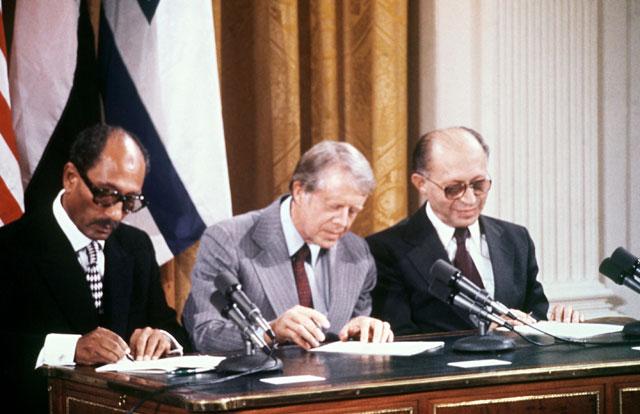You are here
The Egypt, Israel peace treaty sealed 40 years ago
By AFP - Mar 24,2019 - Last updated at Mar 24,2019

In this file photo taken on September 17, 1978, Egyptian President Anwar Al Sadat (left), Israeli Premier Menachem Begin (right) and US President Jimmy Carter sign a peace agreement in the East Room of the White House (AFP photo)
PARIS — Forty years ago Egypt and Israel signed the first ever peace treaty between Israel and an Arab nation, upturning Middle East diplomatic and military relations.
The March 26, 1979, Egypt-Israel Peace Treaty sealed accords which had been settled the previous year at a groundbreaking summit at Camp David, near Washington, between Egypt’s President Anwar Sadat and Israeli Prime Minister Menachem Begin.
Signed in a landmark Washington ceremony overseen by US President Jimmy Carter, it ended three decades of war-mongering between the neighbours and remains in place today.
Here is some background:
‘Pax Americana’
In October 1973 Egypt and Syria attacked Israel with the aim of forcing it to return territories it seized in 1967, including Egypt’s Sinai Peninsula.
Although Cairo managed to make significant advances, its army was eventually pushed back. But its initial success enhanced Sadat’s standing in the region and internationally.
The United States — with whom Sadat had been seeking closer ties — stepped in to force Israel into a partial withdrawal from the Sinai.
In November 1977 the Egyptian leader travelled to Jerusalem for peace talks, becoming the first Arab head of state to visit Israel.
It culminated a year later in the US-brokered Camp David Accords, signed in September 1978 by Sadat and Begin, that envisaged a proper peace treaty between the two nations within three months.
‘Miracle’ treaty
When no formal peace accord had been signed three months later, Begin decided to end Israel’s freeze on the colonisation of occupied Palestinian territories as evoked in the Camp David Accords.
To save the peace process, Carter headed to both countries.
His efforts paid off and on March 26, 1979, Sadat and Begin signed the treaty at a 10-minute White House ceremony attended by some 2,000 dignitaries.
“We have won at last the first step of peace, a first step on a long and difficult road,” said Carter, who signed on as a witness, adding though: “We Must not minimise the obstacles which still lie ahead.”
Sadat praised Carter as “the man who performed the miracle”.
The only controversial note came from Begin who expressed his hope for the “reunification” of Jerusalem, the eastern part of which had been seized by Israel in the 1967 war, a dispute that remains highly sensitive.
Ending 30 years of war
Egypt became the first Arab state to sign a peace deal with Israel, with which it and other Arab nations had been at war since the creation of Israel in 1948.
It led to Egypt regaining the Sinai Peninsula in 1982 and secured the dismantling of Israeli colonies there.
In turn Egypt offered to end hostilities and normalise diplomatic, economic and cultural relations.
The treaty established that Israeli ships would have free passage through the Suez Canal, and the Strait of Tiran and the Gulf of Aqaba would be international waterways.
Arab world fury
The treaty infuriated Arab countries who claimed it neutralised Egypt, the largest Arab state, and undercut their unity.
They slammed it as a “separate peace” and a betrayal, particularly for Palestinian rights.
Egypt was promptly suspended from the Arab League, which moved its headquarters from Cairo to Tunis; most Arab countries recalled their ambassadors and cut diplomatic relations.
Three years later Sadat, also much-criticised at home, was assassinated by Egyptian extremists.
A ‘cold peace’
Israel and Egypt today maintain a “cold peace” — official diplomatic relations and security cooperation amid Egyptian public hostility towards Israel.
Their treaty has withstood conflicts that drew in regional players, including Lebanon (1982 and 2006), Palestinian uprisings (1987 and 2000) and failed peace negotiations between Israelis and Palestinians.
The “Pax Americana” of March 1979 has also made it possible for Egypt to benefit from significant US economic and military aid.
Related Articles
This is a remarkable book, well researched and interesting to read. It details, in almost 300 pages the negotiations that took place in Camp David over 13 days during September 1978.
AMMAN — Did Egyptian and American leaders sell out the Palestinians and their quest for statehood in the widely acclaimed 1978 Camp David Ac
Preventing Palestine: A Political History from Camp David to OsloSeth AnziskaPrinceton/Oxford: Princeton University Press, 2018Pp.435 I
















